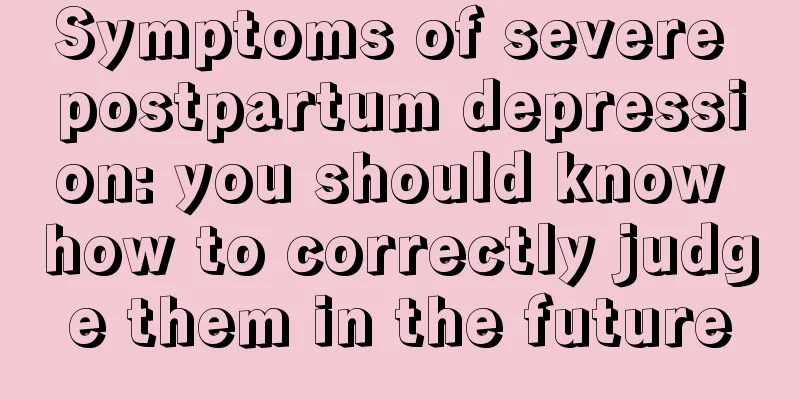Symptoms of severe postpartum depression: you should know how to correctly judge them in the future

|
Many patients with postpartum depression are not aware that they have this mental illness, so they often need the help of their families. Family members can judge whether they suffer from postpartum depression based on their many manifestations in life. To this end, they need to understand the many symptoms of postpartum depression. 1. Depression: The patient will feel low, sad and miserable for a long time, which will be more serious in the morning or at night. Sometimes you feel low in the day and high in the night, which is a reversal of day and night. 2. Bad temper: Patients may feel irritable towards other people's children or their own babies, and the target of their anger is usually their partner. 3. Fatigue: Generally, women after childbirth will feel tired, but patients with postpartum depression will be so tired that they think they are sick. 4. Insomnia: Patients generally have poor sleep or severe insomnia, so they feel drowsy during the day. 5. Loss of appetite: Patients usually do not feel like eating, but sometimes they may relieve stress by binge eating. However, they will feel guilty and uneasy about obesity afterwards. 6. Loss of interest: The patient no longer feels attracted to the things he used to enjoy, his previous interests become boring, and he lacks interest in daily activities. They often feel that their brains are slow to react, they have difficulty thinking about problems, their initiative decreases, they become bored with life, they lose confidence in life, and especially they lose interest in sex, which further affects the relationship between the two parties. 7. Unable to cope with life: The patient will feel that he does not have enough time and that things are not done well, but he loses the motivation to improve the situation. 8. Guilt: Patients may feel guilty for adding to the pressure on their family due to their illness, and may also blame themselves for looking at things from a negative perspective. 9. Anxiety: Patients often feel anxious because they are afraid that they don’t know how to take care of the baby, and at the same time they worry about the baby’s health. 10. Develop thinking disorders, persecution delusions, suicidal thoughts or attempts, and even infant harm or suicidal behavior. |
<<: What medicine can I take to thicken my thin endometrium?
>>: What to do if the endometrium is thin
Recommend
The best time to treat cervical erosion
The cervix is very important to women. After th...
What to do if your ankles swell during pregnancy
Pregnancy should be a very happy thing for women,...
How long does it take to get pregnant after laparoscopy?
Hysteroscopy and laparoscopy is a very common cur...
When is the safe period and dangerous period of menstruation
The female menstrual cycle is divided into the ph...
Side effects of Mirena IUD
Mirena IUD is a common contraceptive measure. Thi...
Methods of female functional exercise
As the pace of life continues to accelerate, many...
Why does leucorrhea look like yogurt?
Women are very concerned about their appearance. ...
What to do if you have severe menstrual cramps due to cold?
It is said that the three inches under the genita...
What causes vulvar dystrophy?
The explanation of vulvar malnutrition in traditi...
A woman dreams of her teeth falling out.
Teeth are a part of our body that we must use eve...
What are the symptoms of women sweating
Profuse sweating is a problem that many people wi...
Reasons for heavy menstrual flow after abortion
Everyone knows that abortion is a very harmful me...
I have my period for three days and only have a little blood
For female friends, menstruation is not unfamilia...
Girls have stomach pain after sex
Many women are troubled by the fact that they exp...
Is it painful for a woman to have an induced labor at five months of pregnancy?
Nowadays, more and more women choose induced abor...









